Review for Star Trek (2009) - 2-Disc Special Edition
Introduction
I never thought that I would be writing this review. I thought that I was done and dusted with Star Trek, bridges burned, book closed and all that. I was a Star Trek fan. Actually, that's too mild a term, as for a goodly while during my formative years, Star Trek was my religion, and I worshiped at the altar of Gene Roddenberry. I lapped it all up, without criticism and without discrimination, from the original pilot episode, The Cage, all the way to These Are The Voyages a few years ago. But by the time Enterprise had rolled its final credits, my faith had long since lapsed. And for anyone whose faith lapses in something, it's no longer a case of just treating one's former passion as waned and non-existent, said passion actually turns to active dislike and even hatred. My passion for the Original Series remains undimmed, I loved the Next Generation when it was on, and Deep Space Nine was exemplary storytelling.
But under the aegis of Rick Berman, the Star Trek franchise became just that, a franchise, a production line, catering for the lowest common denominator, with routine and unimaginative storytelling, tired characters, and a creaky overabundance of continuity and technobabble. Voyager stumbled continuously from the pilot episode to its conclusion, while the stench of fetid decay rose from Enterprise throughout its shortened run, until the network eventually put it out of my misery. The same is true for the feature films, which started so strongly in 1979 when the original cast boldly went onto the silver screen, and their initial features are still thoroughly enjoyable today. But by the time the Next Generation cast got in on the act, all semblance of originality or invention had left the movie franchise, and now, even their most successful feature, First Contact, has more of a glorified television episode feel to it than that of a genuine feature film. It was their final feature film Nemesis that hammered the last nail into the coffin of my fandom. I came out of that cinema utterly disgusted at a franchise that had disappeared up its own continuity, swearing never to spend another penny on Star Trek.
Yet in the summer of 2009, I could be found in the cinema once more, taking in a new Star Trek film. And here I am, writing a review for that same film, although to my credit, I wouldn't be budged until the DVD hit the bargain bucket. The one thing that attracted me was that it was a reboot. Not necessarily a reboot of the story, and I did initially quail at the idea of recasting the iconic characters from the original series. It was that they were rebooting the whole kit and caboodle. They had taken Star Trek, lock, stock and barrel, from the old hands and given it to J.J Abrams, of Alias, Mission Impossible 3, and Lost fame, all shows and movies that I have never actually watched. Just taking music into account, Star Trek has been using the same arsenal of brass and strings for its music since The Next Generation. That's twenty odd years of the same sound accompanying all the episodes. In every other aspect, the franchise was just as tired. If handing it over to a new production team meant a complete reinvention from square one, then colour me enthused. I would love to rediscover Star Trek anew. And sure enough, all the right noises seemed to be coming from the Abrams camp, with the announcement that "This is not your father's Star Trek", propelling me towards the cinema. Until with it came the realisation that it meant that this was not "my" Star Trek. Sure enough, this is a whole new Star Trek, a reboot, a new universe with a new frontier of storytelling opportunities, a whole new cast, new characterisations and unlike anything that has boldly gone before.
And it all begins when a giant Romulan Death Star (Mining Vessel) from the 24th Century arrives in the past, its commander Nero looking for Ambassador Spock and a whole heap of revenge. What he finds is the USS Kelvin, a Federation starship under the command of Captain Robau, with one George Kirk at the helm, and a very pregnant Winona Kirk onboard as well. In the battle that ensues, the ship is destroyed when Kirk sacrifices it against the Romulan ship, buying time for the crew, his wife and his newborn son to escape. Without the influence of a father, James Tiberius Kirk grows up to be a tearaway rebel, drinking his life away in Iowa, until a barroom brawl results in an encounter with Starfleet Captain Christopher Pike, and a challenge to improve his life and live up to his father's example. At the same time on Vulcan, a young hybrid boy named Spock grows up suffering the torment of his peers, and his elders' disapproval of his human heritage, to eschew a path on Vulcan and join Starfleet. In another universe, they would have been friends, but Kirk and Spock's first encounter at the Academy is less than cordial. Their confrontation is interrupted though when a distress call comes in from Vulcan, and with the majority of the fleet engaged elsewhere, all available Starfleet cadets are ordered onto starships to head off for a rescue effort.
This is no simple distress call though. For the same vortex that brought Nero into the past has now finally disgorged his target, 25 years later. Nero's revenge is finally at hand, and it is the Romulan ship that is now attacking Vulcan. Only Kirk has recognised the same pattern of events that preceded the Kelvin's destruction, but he's restricted to the Academy, on report. He'll have to stow away on Starfleet's newest flagship if he can make a difference. He'll have to sneak aboard the USS Enterprise.
The Disc
Trying to find flaws in the transfer of a modern blockbuster movie is pointless, so suffice it to say that the 2.40:1 anamorphic transfer, and the DD 5.1 English soundtrack give the best that the format has to offer, and that if you want more, you'll have to venture into the strange new world of Blu-ray. The image is clear throughout, and I had no complaints. Well, one complaint. Lens flare! Once games programmers discovered lens flare, they stuck it into every game, thinking it was cool. Until they realised that they were being idiots. In the film industry, the general practice was to avoid lens flare, unless they were making a lost in the desert movie, and they wanted the sun to look extra hot. Cinematographers took great pains to limit flares and aberrations. But not Star Trek, which is so loaded with lens flare, glare and haloes that it comes close to giving me a headache. At least it has the effect of making me ignore the shaky cam during the action scenes.
The sound design really punctuates the film well, and you know that you are watching Star Trek from the first frame, when the Kelvin Imperial Star Destroyers its way past the camera, and that distinctive sensor noise is heard. The music is all new and fresh, yet distinctively Star Trek as well, with little touches of the Alexander Courage theme, although it saves the full anthem for the end credits. The dialogue is mostly clear throughout, the action is punchy and effective, and they even occasionally remember that it's quiet in space. Subtitles in English, and a whole heap of Scandinavian languages are available if you need, while visually impaired Star Trek fans can rest easy with the inclusion of a DD 5.1 English audio descriptive track.
Extras
A new Star Trek, with a new Starship Enterprise… What else are you going to have but animated menus with the ship's blueprints spinning on the front screen?
By the way, the feature disc autoplays with trailers for Transformers: Revenge of the Fallen, and G.I. Joe, although the clips are preceded with an informative message telling you that the menu button on your remote will skip them.
On disc 1, you'll find the audio commentary from J.J. Abrams, Bryan Burk, Alex Kurtzman, Damon Lindelof, and Roberto Orci. It's your usual making of commentary (at least from the half hour that I sampled), and it's nice, detailed and informative, although the speakers do bump into each other when talking. You get the usual rationale behind scene deletions, the anecdotes and the rumours. It's all pretty par for the course, although I have to admit to be a little surprised at how upfront they are about the Star Wars influence. The commentary, indeed all of the extras are subtitled, in English at least.
A New Vision lasts 19 minutes, and the cast and crew do their EPK duties about the making of the film, and what they hope to achieve.
The Gag Reel gives 6 minutes of goofing around and line flubs.
Disc 2 has even more subtitles to go with its extras, venturing a little south of the Arctic Circle for its language selection.
The deleted scenes, of which there are 9, are well worth seeing, as they certainly add more to the story, even if their removal for pacing reasons can be justified. In some cases they are a mixed blessing, as the Klingon scenes do explain what Nero and the Romulans were up to for 20-odd years, but hiding the Klingons behind masks does them no favours, and hopefully any future film will come up with a better design. All the scenes come with an optional commentary, and run in total to 16 minutes. These marketers know their stuff, as I was really only interested in these scenes, and had they been on disc 1, I wouldn't have shelled out for the two-disc edition.
To Boldly Go lasts 16 minutes, and is another behind the scenes making of featurette, a little more informative than the one on disc one, as the cast and crew go into more detail about what they hope to achieve with the film, staying true to the original while charting a new course as well.
Casting lasts 28 minutes, and looks at the delicate work of recasting a set of icons, with interviews with the replacements, as well as some input from the originals, such as Nichelle Nichols, Walter Koenig, and of course Leonard Nimoy.
Aliens lasts 16 minutes, and takes a look at the new look aliens, as well as the re-imagining of established classics.
The Score lasts 6 minutes, and composer Michael Giacchino talks about his work for the film.
Both discs are packaged in an Amaray case with a hinged central panel, contained in a very nice, embossed card slipcase. The BBFC stickers on the case are peel-offable.
Normally, trailers on DVDs aren't anything to get excited about, but Star Trek has the most tantalising teaser I have seen for a film, the welder working on the ship as the camera draws back. Guess which DVD leaves the teaser and theatrical trailers off…
Conclusion
"I like this film, it's exciting!" he says in a vague Scottish accent that slips into Indian halfway through. But I have to admit that I quickly developed more of a love hate relationship with the re-imagined Star Trek. It still is the most fun that I have had with a Star Trek movie in 25 years, since The Voyage Home in fact, and watching it for the second time, I had just as much of a blast as I did in the cinema back in summer 2009. It's just that once again, it's when I stop to think about it, that a hollow disappointment begins to set in. I know the fatal mistake with any summer blockbuster is to stop and think about it. But this is Star Trek, heir to a legacy lasting over 40 years, and it has a lot to live up to. An action packed, thrilling summer blockbuster it may be, and surprisingly it isn't as dumb as the average summer blockbuster. That may be damning it with faint praise though, as it is still pretty dumb. The question is, does it feel like Star Trek? Actually, the question is, given the last few Star Trek films; do you actually want it to feel like Star Trek?
It has one thing in common with the last four films though; it has another villain with another superweapon at his disposal, threatening the peace of the galaxy. I know that the Wrath of Khan is the most beloved and cherished of the Star Trek feature films, but trying to recreate its success again and again is only going to result in increasing failure. We've had Khan and his Genesis Device, Soran and his trilithium weapons, the Borg Queen and her Borg minions, Ru'afo and his metagenic umbrella of doom, and most recently Shinzon and his Thalaron thingy, all looking for revenge, all exacting a toll on our heroes, before all biting the dust in some deserving retribution. Now we get Nero and his Red Matter. Yet somehow this film bucks the trend, and is the best such application of this storyline since the original Khan. That's not because of the villains though, as Eric Bana as Nero is more of a personality black hole than the weapon he wields. A more forgettable and non-descript villain is difficult to imagine, and an attempt to add dimension by giving his vendetta an emotional and tragic cause doesn't help. But he's really a plot device to get the rebooted franchise up and running, to get the nu-crew of the Starship Enterprise on board and boldly venturing together by the time the end credits roll. In fact he's even more of a plot device than the weapon he wields.
They may have just called it The Plot Device though, as Red Matter doesn't exactly have a sci-fi zing to it. This Star Trek makes admirable strides in simplifying the jargon, and jettisoning the pages and pages of garbage that trained actors had to spout in shows like Voyager and Enterprise. But Red Matter is probably a simplification too far. Worse, Star Trek takes sci-fi, and dumps the sci bit completely. It does dumb down the plot, which given where most Hollywood sci-fi comes from these days is something I would have thought impossible. A supernova that threatens the galaxy sparks off the whole train of events! Supernovae are big, but not that big. Apparently Romulus is in danger, but old-Spock has a plan to stop it using a portable black hole. Except that he gets his calculations wrong, and Romulus is hit by the shockwave, sending Nero off into his pursuit of vengeance. First thing, Spock, making a mistake like that… I don't think so. But even more, supernovae propagate at the speed of light. If Alpha Centauri went bang, we wouldn't know it for 4 years. Of course we would be toast then, as we don't have starships and sensors and what not, but in Star Trek they do, and Romulus would have had years if not centuries warning to evacuate… But you don't care about that.
Another thing that bugs me is that it isn't a clean reboot. It's a reboot contrivance that starts in the Prime Universe past the Next Generation era, and through egregious use of time travel, rewrites everything to give it a clean slate, a new universe of stories and adventures for our young and pretty recast heroes to go on. It's proven to be a bold new universe by some pretty Earth shattering events in the film, showing that nothing is as it was before. But it kicks off with some Earth shattering events in the Prime Universe that will have an effect on the stories and adventures that could still be told there. Okay, we're not liable to see anymore Next Generation movies, or any more Deep Space Nine on television, but authors and comic book writers, computer game creators too still play in that universe, and this film leaves them with a mess to clean up and imposes limits on their stories… And you could care less about that as well…
That's the problem with watching Star Trek through 40 years of fandom and criticism, it tends to colour one's perception of the film. It turns out that JJ Abrams wanted to make a Star Wars movie. Unfortunately, the Great Bearded One guards that property with an iron will, so Abrams had to go for the next best thing, turning Star Trek into Star Wars, and by and large he succeeds. It's a toss up whether he hits the original trilogy ballpark or misses and gets prequel instead, but at least there's no Jar-Jar in this… Well, the jury's still out on nu-Chekov, but it isn't that bad. But in terms of the pace, the action, the fun, Star Trek hits all the right Star Wars notes, and leaves plenty of room for homage as well. We start with a Star Destroyer-esque flypast of the Kelvin, straight into a frenetic space battle lightshow that could easily have come from Revenge of the Sith. The commentary makes note of the Cantina scene homage, and the Tatooine sunset moment, and of course there is the Delta Vega excursion, which may as well be the planet Hoth, and it also provides the film's 'Bigger Fish' moment as well. Fortunately, it isn't all homage and parody, as Star Trek very firmly sets out its story, and proceeds to tell it with vigour, pace and humour.
That's probably what I appreciate most about this Trek reboot, the sense of humour and fun to it all. With the exception of The Voyage Home, the original cast movies were a lot more serious and intense dramatic affairs, while with the advent of The Next Generation, things got a lot more staid and even stolid. It was regimented and controlled and very singularly focused storytelling that lost something of the spirit of the original series, where the mood could turn on a dime and it would still feel natural. You couldn't have a Harry Mudd in the later series; indeed the one time they tried it in the Next Generation with the Outrageous Okona, it failed miserably. But this Star Trek captures that wild, almost improvisational spirit quite well, and to its credit, the comedy almost always feels naturally grown from the situation. McCoy sneaking Kirk onto the Enterprise is a prime example, as is Scotty beaming into a giant water conduit. It also hits all the right dramatic beats as well, showing Kirk's rebellious and improvisational nature, Spock's divided heritage and the effect it has on him, and the mutual antagonism of these two characters slowly turning to respect, and the start of a friendship.
The cast really works well as an ensemble, even with just the one film under their belt, and any difference in characterisation can be put down to the rebooted universe giving them different back-stories. The biggest change of course is in James T Kirk; in the original series he was the walking stack of books at the Academy that became a maverick starship commander and ladies man. Chris Pine wisely eschews William Shatner's distinctive style, but suggests just enough of that character to highlight the similarities. The difference of course is in his upbringing, the lack of a father, teenage rebellion all leading to this Kirk being more of a maverick, even than before. Zachary Quinto as Spock is uncanny. In terms of his speech, his stance, his mannerisms, it's as if he is channelling Nimoy's performance at times. Yet his Spock is a little more comfortable in his own skin, and while his divided heritage has shaped him and motivated him, he doesn't seem as tormented by it. Certainly the original series Spock would have been wary of committing to an intimate relationship. Karl Urban's McCoy is a little more rough-hewn and burlier than the original in stature, and a little more gruff and sarcastic in nature, but it works very well in the context of the film. The revelation is Uhura, played here by Zoë Saldana, who gets a role that is much more central and emotionally powerful. It also provides a neat little unexpected blindside to the story. People used to talk about the big three in the original series, Kirk, Spock and McCoy, while the other characters sort of tagged along. Not anymore.
John Cho as Sulu doesn't get as much to do, but he uses the scenes that he does get to certainly establish the character and get him into people's minds, especially with his lightsaber battle (sword fight) with the Romulan aboard the WMD. Scotty I'm not quite sure on as yet, especially as it's hard to see Simon Pegg as anyone but Simon Pegg, and the comedy sidekick Keenser would be the annoying Ewok of the film. The annoying Gungan, for me that is, is Chekov, with Anton Yelchin laying the comedy accent on a little too thickly for my liking, and not really establishing the character, rather just a comedy fixture on the bridge.
The look of the film is something of a mixed bag. This is the first Star Trek film to properly take advantage of the theatrical format since The Motion Picture. It really does feel like a movie, a motion picture event, rather than an up-scaled television show. The future has never been so grand, with both Vulcan and Earth looking astounding. Earth in particular blends the future with the recognisable, and seeing these indescribably massive structures in the distance in an Iowan corn field truly indicates that this is the future, not just a slightly disguised present with a matte painting in the background. The upgraded technology and feel of the film captures just enough of the original series as is justifiable, while keeping it current enough for modern audience sensibilities. It was mostly a good idea to use existing buildings and structures to blend into the future, so that you would have your actors in a real environment instead of a virtual set. Some of Vulcan's halls look stunning, Starfleet Academy suitably grand, but an industrial look has been applied to the ships that make them look more steampunk than futuristic, using factories to double for ship interiors. I'm sorry; a brewery standing in for engineering only looks like a brewery. The ships are gargantuan now, twice the size and more of what they were originally, and a window on the bridge, has replaced the viewscreen, which I think is daft. Also daft is the product placement. Even in the 23rd Century you can't get away from mobile phones and watered down beer. Then again 2001 had product placement. And I hate lens flare!
Star Trek is great fun. For two hours it grabs hold of you and doesn't let go. It's entertaining, it's thrilling, it's funny, and yes, it is exciting. It's also silly, reliant on coincidence and contrivance, and in a first for Star Trek, lacks any sort of message or allegory. It's a proper summer action flick, primarily about blowing stuff up, and making the audience whoop in delight, not give them anything to think about. They're not saving the whales this time, or lamenting the onset of middle age. But what the film does do is introduce a very appealing cast of characters, and establishes a very promising chemistry between them. It makes you want to see more Star Trek, which let's face it, Star Trek hasn't been able to do for the last ten years or more. Watch this film and enjoy the thrill ride. Just don't make my mistake and think about it afterwards, or else you'll be asking questions like, how can a cadet be promoted directly to captain of a flagship, why when Nero was sent back in time, didn't he use the intervening 150 years to save his people, and what kind of pressed for time scriptwriter has nu-Spock dumping nu-Kirk on Hoth, where he encounters the Wampa Ice Lobster, old Spock, and nu-Scotty as well?
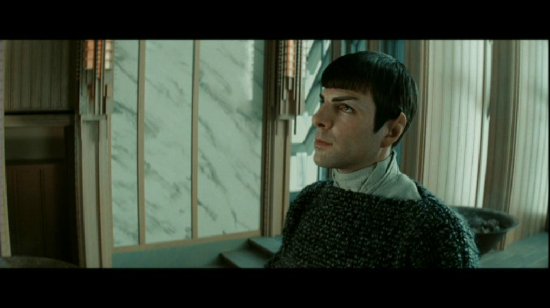
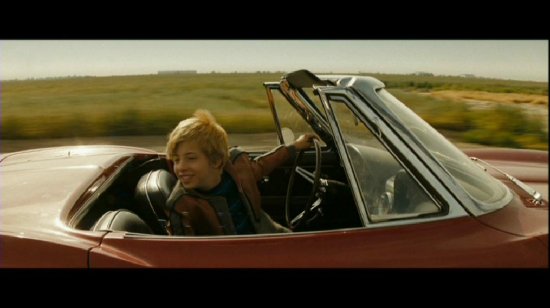
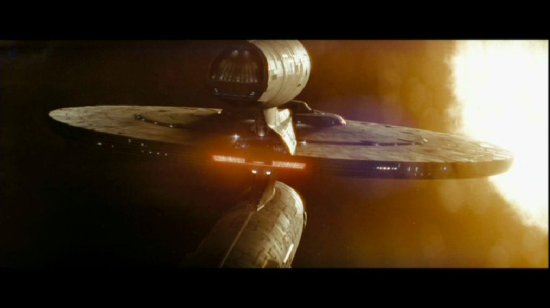
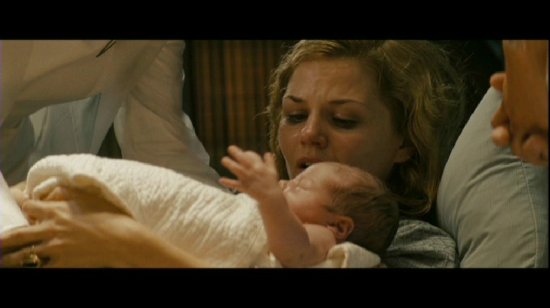
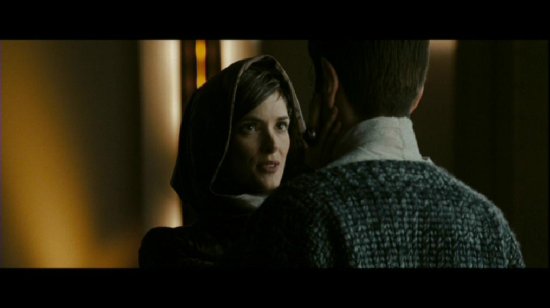
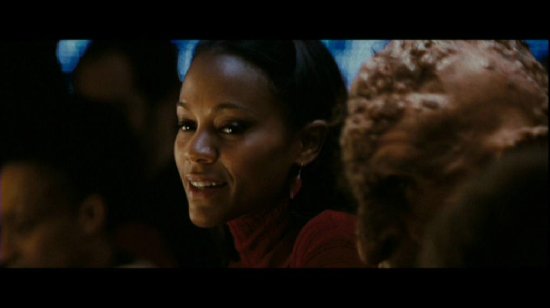
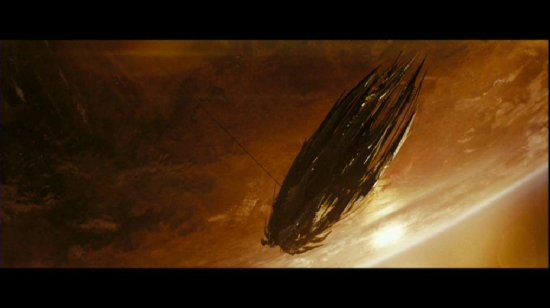
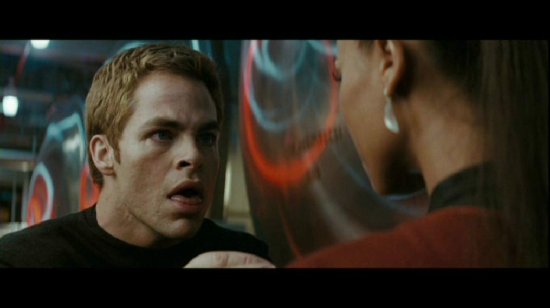
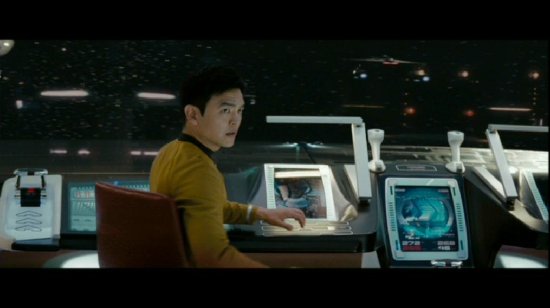
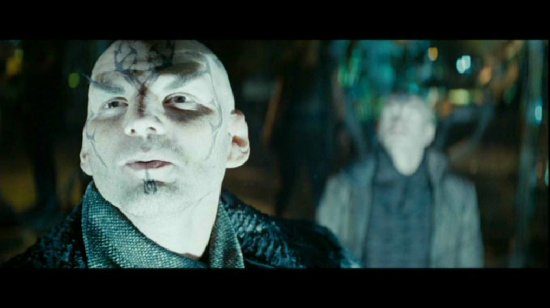
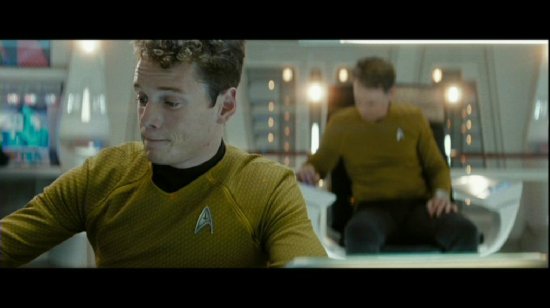
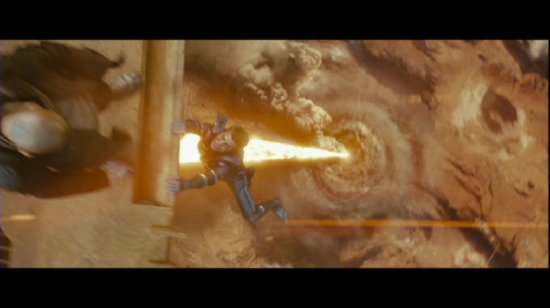
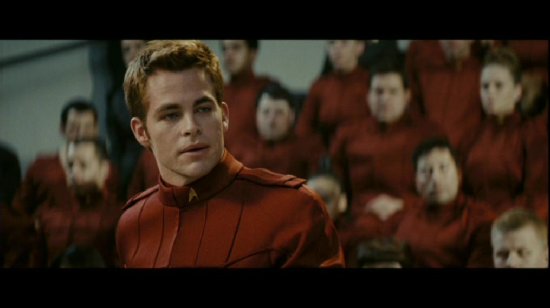
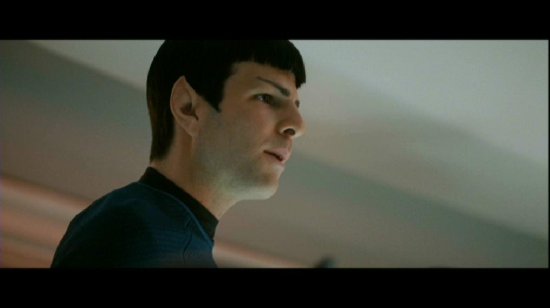
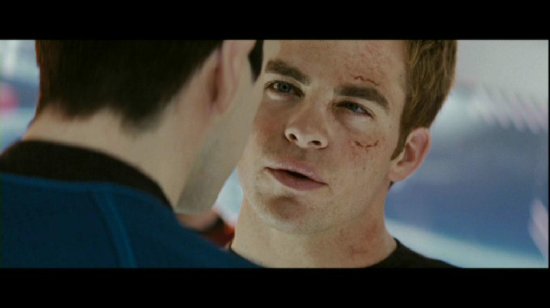
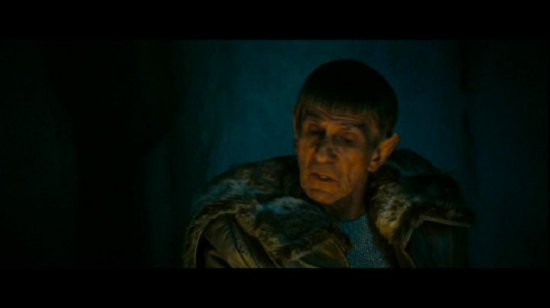
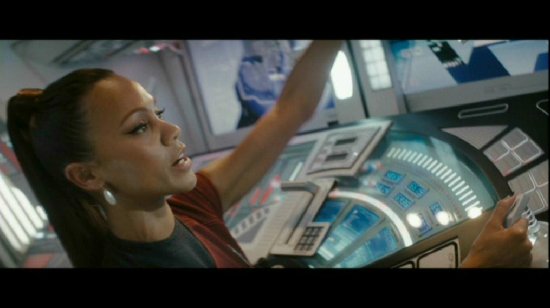
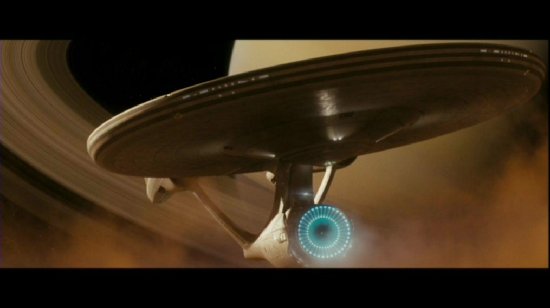
Your Opinions and Comments
I think a Wrath of Khan Take Two would have been a better rebooting point, or maybe finding out that Kirk as an idiot ensign aboard the first contact vessel had precipitated the whole Klingon War by bilking a Klingon ensign in a game of poker.
Khan is such an iconic character, so owned by Ricardo Montalban, that I hope he's one character that doesn't get rebooted. Actually, following five straight movies of villains and superweapons, I hope they go a completely different, lighter direction with the next movie. If they are going to revisit a character, maybe Harry Mudd, given a Johnny Depp, Jack Sparrow type reworking...
The reboot IMHO went wrong with the whole idea of using the Romulans again. I think (after the trainwreck that was Nemesis) they should have used one of the strong villains to do a reboot - maybe the Klingons nuking Vulcan to mess up the Federation of Planets.
I agree with you about Ricardo Montalban, but seeing as we have a new Jim Kirk and a Spock...
Harry Mudd. Personally, I've had a long-held fantasy of him turning out to be an alternative-universe James Tiberius Kirk operating under an alias.
The main thing I like about the reboot is that finally the franchise seems to be moving away from its Starfleet fetish - the whole over-emphasis on Starfleet and the Starfleet Way, the technobabble and the design-rut they've dug. Shirley not everybody works for Starfleet in the 23rd Century? Can't we see other space travellers from time to time? Did DS9 have to be all about Starfleet's presence on the station? Couldn't Sisko have been one of the shopkeepers instead? Couldn't Katie Janeway have simply gathered together the survivors of the Starfleet and Maquis crews together and led them because of her personality rather than because she was wearing one of those bloody elasticated romper suits?